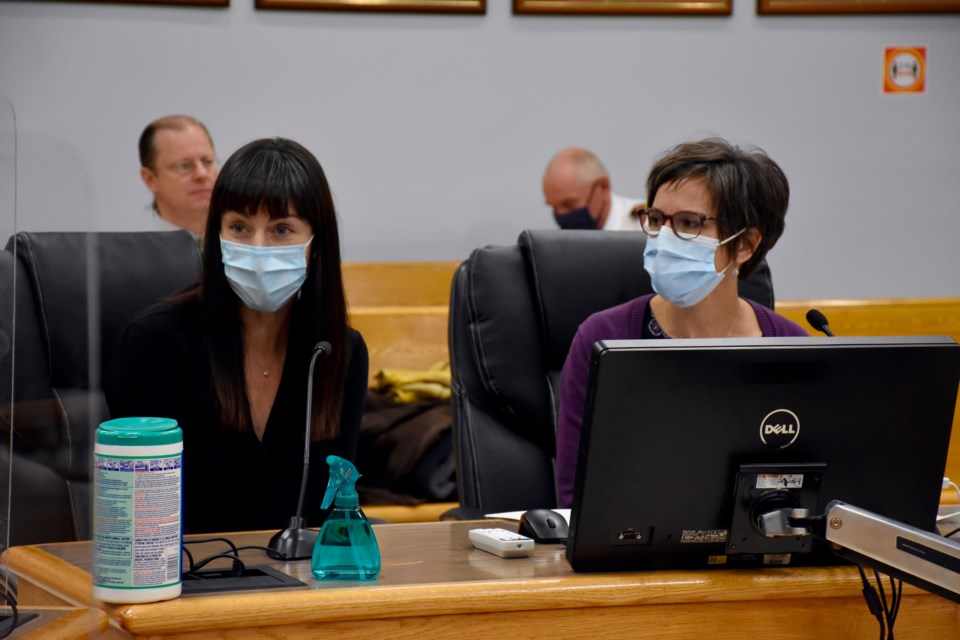Two Timmins doctors working to innovate the way people access addictions treatment have earned national recognition.
Dr. Louisa Marion-Bellemare and Dr. Julie Samson received the College of Family Physicians of Canada (CFPC) 2021 Award of Excellence. The awards were handed out virtually on Nov. 10.
“The unwavering determination of Dr. Marion-Bellemare and Dr. Samson to develop a comprehensive addictions treatment approach has had a concrete positive impact on the Timmins community,” said Dr. Elizabeth Muggah, Ontario College of Family Physicians president in a news release.
“As extraordinary leaders and educators, advocating for the often-voiceless members of our society, these dedicated family physicians are helping people reclaim their lives and I am pleased to recognize their achievements with this award.”
While they're grateful and honoured their colleagues noticed their work and sent in the nomination, they didn't set out for recognition. Their goal is to make change for the people who need them most.
“And now things have changed tremendously. Especially at the hospital in linking these people to services in the community ... patients are getting immediate access to care when they request it if they present to the emerg department, which was not happening before,” said Samson.
It was just over a year ago that the pair first went public with their work to address the overdose deaths in Timmins. In a presentation to city council, they talked about the staggeringly high rate of overdose deaths in the city and how to break down silos and improve the system.
Their work quietly started earlier in 2020.
On their morning runs, the emergency room physicians talked about how bad the local opiate crisis was getting.
In the last three years, they had anecdotally noticed a substantial increase in the number of overdoses in the emergency department. Otherwise healthy, young people were dying of opiate overdoses in larger numbers than the five years before that, said Marion-Bellemare.
"When we actually gathered the data from the chief coroner’s office and really realized what we thought, it was actually happening — that Timmins was the epicentre of the opiate crisis. We had the worst deaths per capita in our province and that really sparked the urgency once we really started realizing this is true, it’s not just anecdotal,” she said.
Change is happening.
They've developed an addictions management team and advocated for two designated detox beds at Timmins and District Hospital. A primary care clinic at Living Space has been created and they've started a virtual clinic for addictions management in Attawapiskat.
“Drs. Marion-Bellemare and Samson have been inspiring and innovative groundbreakers on the addiction medicine front in Timmins as well as the far north of Ontario,” said Kate Fyfe, Timmins and District Hospital CEO in the news release.
“Not only have they developed an in-hospital addiction team, they have been instrumental in engaging community and regional partners to foster collaboration and accountability, and to ensure accessible, appropriate and equitable care for marginalized individuals.”
In September, the City of Timmins also committed over $1 million to fund an Urgent Public Health Needs Site (UPHNS).
The UPHNS is a temporary solution and would bridge the gap while work is done to establish a supervised consumption site, which could take two to three years to work through the approvals.
While the permanent site has a funding stream, the UPHNS does not.
“We would love to get it open in the new year, but there’s a lot of things that need to be done ahead of time," said Samson.
The UPHNS will be what Samson describes as a "one-stop-shop" for people who need help.
Along with being a safe-injection site, people will be able to access treatment, social services and primary care.
The key to the doctors' plan is breaking down barriers and meeting patients where they are. It's offering treatment when people are asking for it.
"We can’t blame the patient, we have to reorganize the system. We’re so used to blaming the patient and instead we need to think about where are we going wrong in the system that is not allowing the patient to get help. That’s a big part of what we’re trying to change. We’re never going to have a perfect system, but so long as we keep trying to meet the needs of the patient and changing, then we’re trying our best,” said Marion-Bellemare.
Their work is also drawing the attention of municipalities and organizations across the country.
Along with their fulltime jobs and work after hours to redefine addictions treatment in the community, the pair is actively sharing what they've learned over the past two years.
Calgary, Vancouver and London, Ont., are a few of the municipalities they said have reached out.



